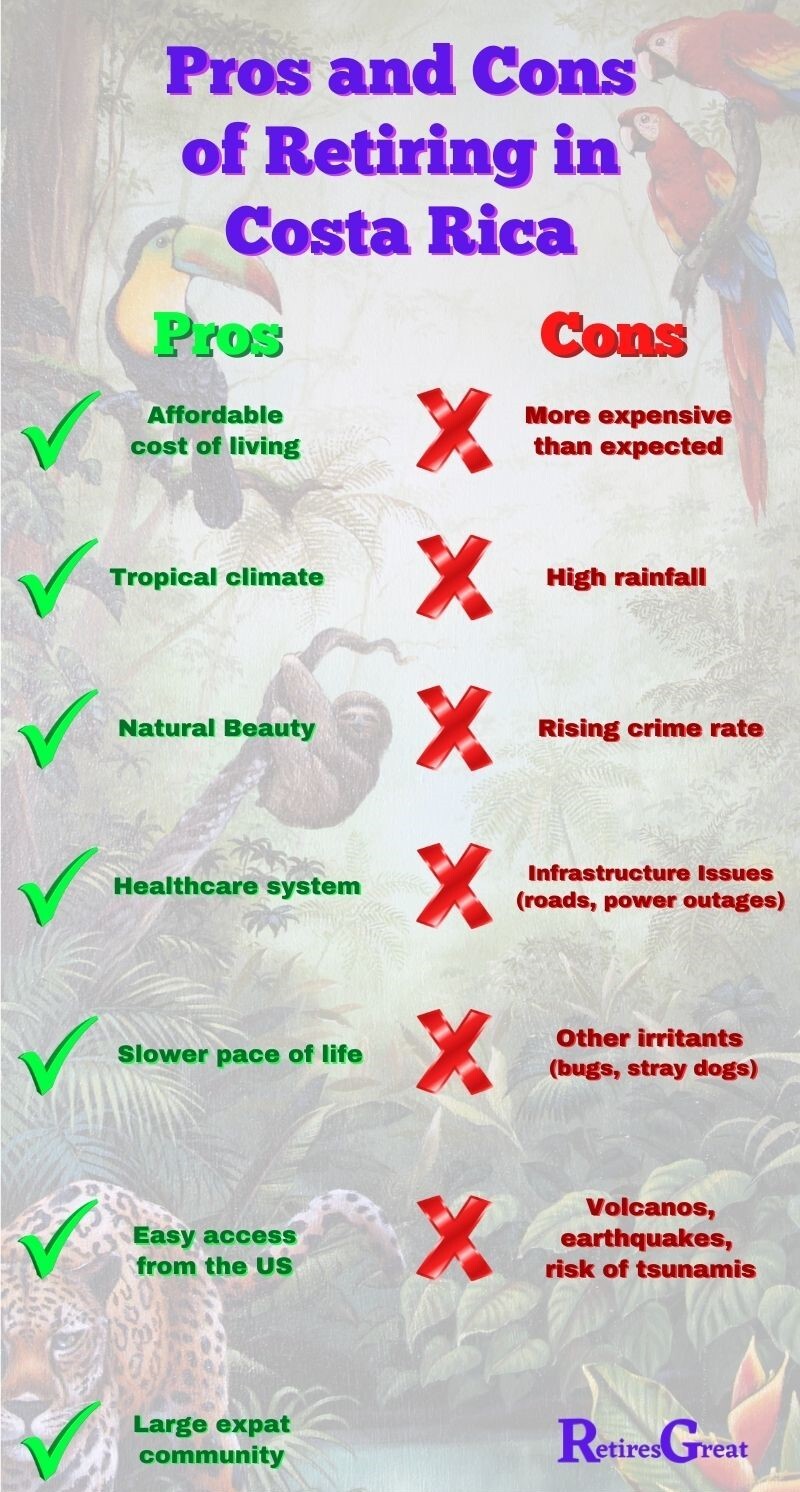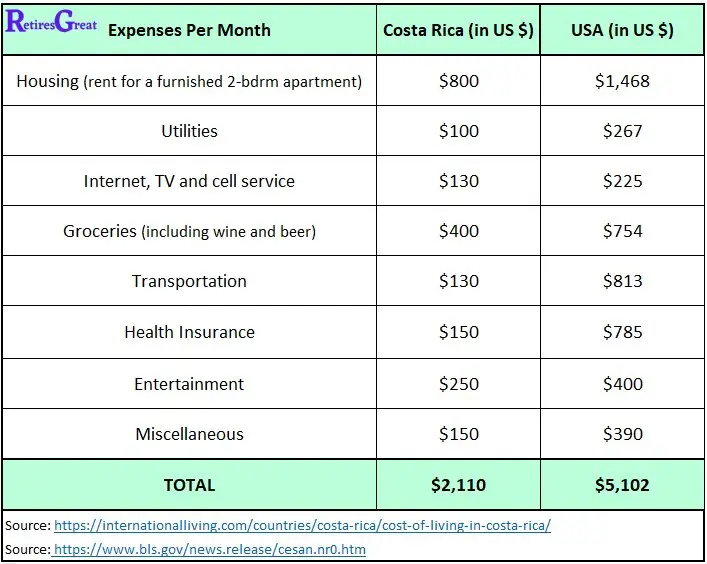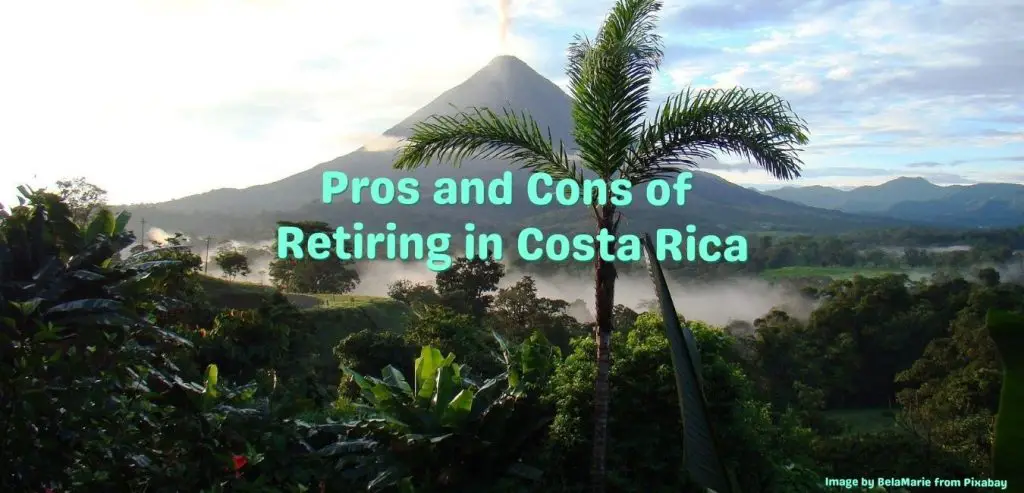Whenever the discussion on retiring abroad arises, Costa Rica inevitably comes to mind. In fact, about 70,000 US citizens (mostly retirees) are already living there. As with any other country, there are advantages and disadvantages of retiring there.
Pros and cons of retiring in Costa Rica are:
Pros
Cons
The greatest appeal of Costa Rica is living in almost paradise for a fraction of the cost back home. The beautiful beaches and lush green rainforests truly are spectacular!
And, it’s widely reported an average American couple can live comfortably on $2,000 a month. As wonderful as all this sounds, stories abound of disillusioned expats returning home.

Cost of Living
Compared to the U.S., the cost of living can be significantly less. According to a recent survey by the National Statistics and Census Institute (INEC), the average Costa Rican monthly household income works out to be about $1,250 USD.
The table below shows expenses for the average expat couple compared to living in the US.

Pros
If you chose to live like a “Tico”, as Costa Ricans are referred to, you could get by on a $1,000 a month. More realistically, it’ll cost around $2,000 and more would be even better. Many couples can live quite comfortably off their Social Security.
Rental properties are inexpensive and, generally, fully furnished. When it comes to food, the “feria” or weekly farmers’ markets offer an abundance of fresh fruits, vegetables and meats at reasonable prices.
Cons
Most Americans desire a standard of living closer to what they had back home. Housing (and rental) prices vary widely across the country. If you chose to purchase a home in a gated community, you could be spending $300,000 or more.
With high import taxes, almost everything not produced locally will cost more. This includes all those modern appliances, imported foods and even vehicles. Even dining out can cost about the same as back home.
Tropical Climate
Located close to the equator, Costa Rica remains warm throughout the year. There's little fluctuation other than the rainy season lasting about half the year. This is why it’s one of the pros and cons of retiring in Costa Rica.
Even the hours of daylight remain remarkably constant with about 12 hours of sunshine every day.
Pros
The average annual temperature on the coast is 80 – 90°F. The mountainous inland areas are slightly cooler averaging 75 – 80°F. If winter isn’t your thing, you’ll love the temperate climate. No snow to shovel or icy conditions to deal with.
Cons
The downside is the “green season” where it rains almost daily and, sometimes, for days on end. This lasts from May through to November with an average of 100 inches of rain.
Certain mountainous regions can receive 25 feet of rain and are prone to flooding.
Filled With Natural Beauty
Largely unspoiled, Costa Rica is considered one of the most beautiful countries in the world. This includes gorgeous beaches, a rich variety of flora and fauna and virgin rain forests. The rugged mountainous interior is filled with volcanos.
There’s lots to see and do for anyone who appreciates nature. The government has created 28 national parks to protect Costa Rica’s national treasures. Three of these have been designated UNESCO World Heritage sites:
Roughly, a quarter of the country is protected to retain the rich eco-diversity. Some of the endangered species include squirrel monkeys, great green macaws and the jaguars.
Is Costa Rica Safe?
Costa Rica is considered to be the safest country to live in Central America. According to the 2020 Global Peace Index, it was ranked 32nd out of 163 countries. However, being a third world country, opportunist theft and petty crimes are rampant.
Their primary issue is one of geography. Columbian and Mexican cartels move vast quantities of drugs through the country. In addition, the influx of refugees and migrants searching for a better life heightens economic disparity.
All this contributes to an increase in crime. Over the past year, the homicide rate increased from 11.9 per 100,000 people to 12.3.
Pros
Common sense and basic precautions greatly minimize the risk of theft. Really no different than back home. The tourist areas are where the bulk of these crimes occur.
Another pro is the government is very stable. More so than any other country in Latin America. In fact, the army was abolished in 1949 and military spending was reallocated to improve quality of life.
Cons
The police are seldom able to resolve cases of petty theft. It appears Costa Ricans are lackadaisical about rising crime rates believing their country to be safe.
With the majority of crime in tourist areas, this laid-back attitude does little to address a growing problem.
Good Healthcare System
A critical consideration when living abroad is the quality of healthcare. In this regard, Costa Rica is frequently cited as very good.
The World Health Organization (WHO) rank them as 36th in the world, ahead of the United States, Cuba and New Zealand.
Pros
In addition to offering a high level of healthcare, it’s also inexpensive. The universal healthcare system known as “Caja” is low cost and available to all legal residents.
For about $150.00 a month, this includes doctor’s visits, surgeries, prescriptions and more.
Additional private healthcare is available for a fraction of the cost of back home. According to International Insurance, the average medical premium for expats is $596.08 per month.
Cons
In spite of an overall good healthcare system, there are several aspects to be aware of. Smaller towns may not have medical facilities or even an ambulance. When they’re located three or more hours away from a major center, this can become problematic.
Another concern are delays with public healthcare. There can be extended waiting times for treatment and, in some situations, it’s necessary to use the private system. In addition, certain medications may not be available or cost prohibitive.
Slower Pace of Life
The Costa Ricans have a saying “Pura Vida”, which means “pure life”. This describes their laid-back approach and no one can ever accuse them of rushing anything, making it another of the pros and cons of retiring in Costa Rica.
They live in a beautiful land and take the time to enjoy it. The people are friendly and according to the World Happiness Report, they're the 12th happiest country in the world.
Pros
Retirement is supposed to be about slowing down and enjoying life. In this respect, the Costa Rican lifestyle might be ideal. Compared to our bustling North American ways, this is a pleasant change as stress and pressures fade away.
Cons
There’s no sense of urgency for anyone! On time to them is being 15 to 30 minutes late. It’s something you’ll have to get used to or you’re going to drive yourself crazy.
Almost everything seems to take longer than it should and there’s such thing as rushing. For instance, your toilet backs up and you need a plumber. This could take a day or two to get resolved!
This also extends to governmental bureaucracy. Everything moves slowly as there’s no push to get things done in a timely manner.
Easy Access from the US
It’s easy to get to Costa Rica and the country welcomes vacationing Americans. You can stay for up to 90 days as a tourist. For anyone deciding to move there, the visa process is relatively straight forward.
In our post, advantages of retiring to Portugal, we mention how easy it is for expats to come. The biggest difference is a much longer flight to get there.
Pros
Not only is it easy to fly to Costa Rica, it’s also relatively inexpensive. Most major US airports offer direct flights and the flying time from Houston is 3 hours and 35 minutes. Way easier to get to than most other “retirement” countries.
Cons
There is a $31.00 airport departure tax payable. Everyone flying out of Costa Rica needs to pay this. Special counters in the airports are set up where the tax can be paid by cash or credit card.
A few airport hotels can also handle this on your behalf, although they generally charge extra.
Large Expat Community
One of the advantages of Costa Rica is the large expat community and all the support it provides for newcomers.
The majority of expat communities are clustered on the Pacific side. These include the central valley encompassing San Jose, the Gold Coast, the southern zone and Lake Arenal.
Pros
Moving to a new country can be stressful. Adapting to a different culture, customs and language is never easy. When there’s an existing expat community, it becomes easier. There is a common bond as your neighbors are similar to yourself.
Cons
These communities will be more expensive. Instead of embracing the Tico way of life, many expats choose to insulate themselves in gated communities. They’ll shop in more expensive stores which stock American goods and foods.
Infrastructure Issues
To put it politely, there are serious infrastructure issues. Outside of the major centers, the roads are atrocious. There are stories of potholes so deep the locals’ put sticks in them to warn motorists.
Guard rails are non-existent with heavy rains causing some to wash out. Making matters even worse, Costa Ricans drive like madmen.
Besides being expensive, electrical outages are common. Like everything else in the country, they seem to take a long time to be resolved.
Other Irritants
The rain forests and jungles are breeding grounds for insects and a wide variety of creepy crawlies. In addition, the country is geologically unstable with shifting tectonic plates.
Closing Thoughts on Pros and Cons of Retiring in Costa Rica
There are numerous reasons why Costa Rica is considered the best country to retire abroad in. With a relatively low cost of living, decent healthcare system and gorgeous beaches; this could fulfill your retirement dreams.
Easy access with established expat communities further explains the appeal for many. However, no place is perfect and many expats choose to return home.
There are a multitude of reasons which, often, are quite personal. Such as feeling homesick and desiring to be closer with family. In other situations, their expectations of living abroad were different than the experience.
As much as you might love vacationing in Costa Rica, it’s advisable to spend more time there before making a major move.
Perhaps trying out several different areas to find where you’ll be most comfortable. It's also highly recommended to rent a place for several months during the rainy season.
Related Posts:
Pros and Cons of Retiring to Panama
Which is the Best Place to Retire: Panama or Costa Rica
Is Puerto Vallarta a Good Place to Retire?
Retiring in Lake Ajijic Lake Chapala Mexico
Amazing Advantages of Retiring in Portugal
Reasons Not to Retire in Malaysia
Retirement Location Criteria to Determine the Best Place to Retire

